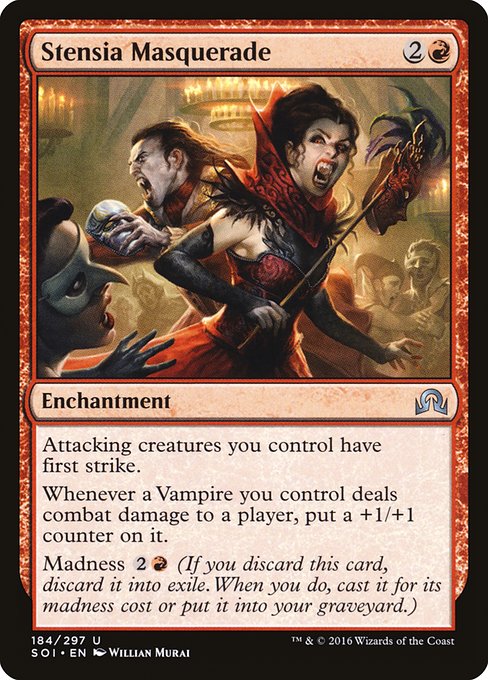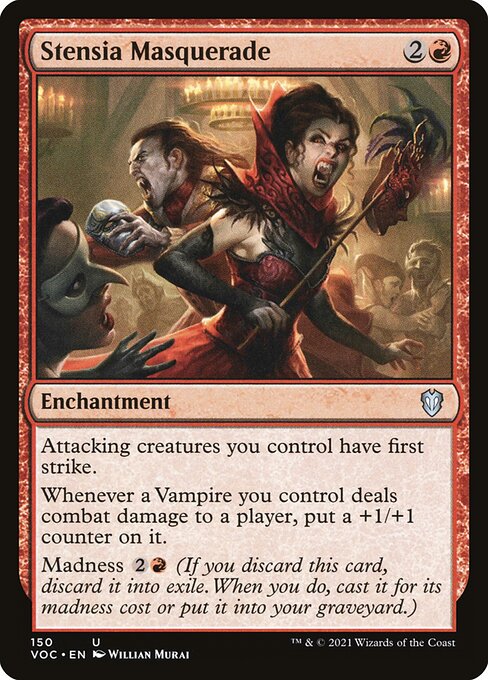Маскарад в Стенсии
Чары
Атакующие существа под вашим контролем имеют Первый удар.
Каждый раз, когда Вампир под вашим контролем наносит боевые повреждения игроку, положите на него один жетон +1/+1.
Бешенство (Если вы сбрасываете эту карту, сбросьте ее в изгнание. Когда вы это делаете, разыграйте ее за ее стоимость Бешенства или положите на ваше кладбище.)
Каждый раз, когда Вампир под вашим контролем наносит боевые повреждения игроку, положите на него один жетон +1/+1.
Бешенство (Если вы сбрасываете эту карту, сбросьте ее в изгнание. Когда вы это делаете, разыграйте ее за ее стоимость Бешенства или положите на ваше кладбище.)
standard
future
historic
gladiator
pioneer
explorer
modern
legacy
pauper
vintage
penny
commander
brawl
alchemy
paupercommander
duel
oldschool
premodern
Rulings
Casting a spell for its madness cost doesn’t change its mana cost or its mana value. You just pay the madness cost instead.
Losing or gaining first strike after first-strike damage has been dealt won’t cause a creature to deal combat damage twice or to not deal combat damage.
A spell cast for its madness cost is put onto the stack like any other spell. It can be countered, copied, and so on. As it resolves, it’s put onto the battlefield if it’s a permanent card or into its owner’s graveyard if it’s an instant or sorcery card.
Madness works independently of why you’re discarding the card. You could discard it to pay a cost, because a spell or ability tells you to, or even because you have too many cards in your hand at the end of your turn. You can’t discard a card with madness just because you want to, though.
If you choose not to cast a card with madness when the madness triggered ability resolves, it’s put into your graveyard. You don’t get another chance to cast it later.
Effects that cause you to pay more or less for a spell will cause you to pay that much more or less for its madness cost, too.
If you discard a card with madness to pay the cost of a spell or activated ability, that card’s madness trigger (and the spell that card becomes, if you choose to cast it) will resolve before the spell or ability the discard paid for.
If you discard a card with madness while resolving a spell or ability, it moves immediately to exile. Continue resolving that spell or ability—the card is not in your graveyard at this time. Its madness trigger will be placed onto the stack once that spell or ability has completely resolved.
Cards are discarded in a Magic game only from a player’s hand. Effects that put cards from a player’s library into that player’s graveyard do not cause those cards to be discarded.
When you cast a card with madness, it was still discarded. If it was discarded to pay a cost, that cost is still paid. Abilities that trigger when a card is discarded will still trigger.
Losing or gaining first strike after first-strike damage has been dealt won’t cause a creature to deal combat damage twice or to not deal combat damage.
A spell cast for its madness cost is put onto the stack like any other spell. It can be countered, copied, and so on. As it resolves, it’s put onto the battlefield if it’s a permanent card or into its owner’s graveyard if it’s an instant or sorcery card.
Madness works independently of why you’re discarding the card. You could discard it to pay a cost, because a spell or ability tells you to, or even because you have too many cards in your hand at the end of your turn. You can’t discard a card with madness just because you want to, though.
If you choose not to cast a card with madness when the madness triggered ability resolves, it’s put into your graveyard. You don’t get another chance to cast it later.
Effects that cause you to pay more or less for a spell will cause you to pay that much more or less for its madness cost, too.
If you discard a card with madness to pay the cost of a spell or activated ability, that card’s madness trigger (and the spell that card becomes, if you choose to cast it) will resolve before the spell or ability the discard paid for.
If you discard a card with madness while resolving a spell or ability, it moves immediately to exile. Continue resolving that spell or ability—the card is not in your graveyard at this time. Its madness trigger will be placed onto the stack once that spell or ability has completely resolved.
Cards are discarded in a Magic game only from a player’s hand. Effects that put cards from a player’s library into that player’s graveyard do not cause those cards to be discarded.
When you cast a card with madness, it was still discarded. If it was discarded to pay a cost, that cost is still paid. Abilities that trigger when a card is discarded will still trigger.
Rulings
Casting a spell for its madness cost doesn’t change its mana cost or its mana value. You just pay the madness cost instead.
Losing or gaining first strike after first-strike damage has been dealt won’t cause a creature to deal combat damage twice or to not deal combat damage.
A spell cast for its madness cost is put onto the stack like any other spell. It can be countered, copied, and so on. As it resolves, it’s put onto the battlefield if it’s a permanent card or into its owner’s graveyard if it’s an instant or sorcery card.
Madness works independently of why you’re discarding the card. You could discard it to pay a cost, because a spell or ability tells you to, or even because you have too many cards in your hand at the end of your turn. You can’t discard a card with madness just because you want to, though.
If you choose not to cast a card with madness when the madness triggered ability resolves, it’s put into your graveyard. You don’t get another chance to cast it later.
Effects that cause you to pay more or less for a spell will cause you to pay that much more or less for its madness cost, too.
If you discard a card with madness to pay the cost of a spell or activated ability, that card’s madness trigger (and the spell that card becomes, if you choose to cast it) will resolve before the spell or ability the discard paid for.
If you discard a card with madness while resolving a spell or ability, it moves immediately to exile. Continue resolving that spell or ability—the card is not in your graveyard at this time. Its madness trigger will be placed onto the stack once that spell or ability has completely resolved.
Cards are discarded in a Magic game only from a player’s hand. Effects that put cards from a player’s library into that player’s graveyard do not cause those cards to be discarded.
When you cast a card with madness, it was still discarded. If it was discarded to pay a cost, that cost is still paid. Abilities that trigger when a card is discarded will still trigger.
Losing or gaining first strike after first-strike damage has been dealt won’t cause a creature to deal combat damage twice or to not deal combat damage.
A spell cast for its madness cost is put onto the stack like any other spell. It can be countered, copied, and so on. As it resolves, it’s put onto the battlefield if it’s a permanent card or into its owner’s graveyard if it’s an instant or sorcery card.
Madness works independently of why you’re discarding the card. You could discard it to pay a cost, because a spell or ability tells you to, or even because you have too many cards in your hand at the end of your turn. You can’t discard a card with madness just because you want to, though.
If you choose not to cast a card with madness when the madness triggered ability resolves, it’s put into your graveyard. You don’t get another chance to cast it later.
Effects that cause you to pay more or less for a spell will cause you to pay that much more or less for its madness cost, too.
If you discard a card with madness to pay the cost of a spell or activated ability, that card’s madness trigger (and the spell that card becomes, if you choose to cast it) will resolve before the spell or ability the discard paid for.
If you discard a card with madness while resolving a spell or ability, it moves immediately to exile. Continue resolving that spell or ability—the card is not in your graveyard at this time. Its madness trigger will be placed onto the stack once that spell or ability has completely resolved.
Cards are discarded in a Magic game only from a player’s hand. Effects that put cards from a player’s library into that player’s graveyard do not cause those cards to be discarded.
When you cast a card with madness, it was still discarded. If it was discarded to pay a cost, that cost is still paid. Abilities that trigger when a card is discarded will still trigger.
Votre collection ? vos decks ?
Envie de gérer votre collection et/ou créer des decks ?


 0
0
 0.19€
0.19€
